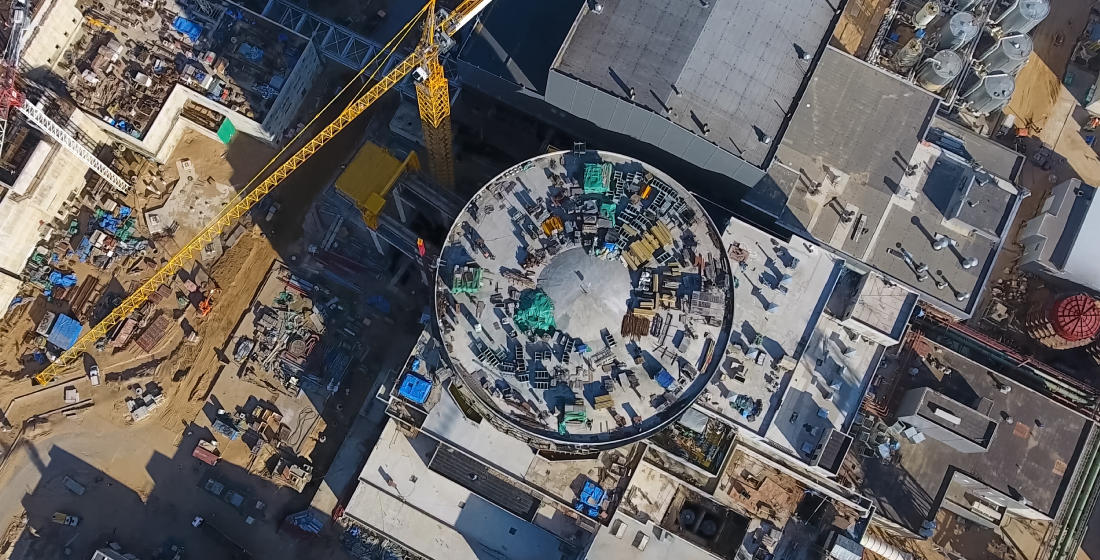Trade digitisation and ESG improv: Yes and, not yes but
TXF’s Global Trade Virtual 2021 event took us on the rollercoaster journey of financing international trade last week. Saying “yes, and” could get the markets to help financing trade more sustainably (and digitally)

Answering any proposition with “yes, and – not yes, but”. That’s one of the techniques for building improvisational (improv) skills on comedy courses. Somebody puts a proposition to you and you answer ‘yes, and’ then you build on the initial idea – that way, weird and (sometimes) wonderful things happen. If you say ‘yes, but’…it can shut down opportunities.
It’s a bit like that in the confluence of the worlds of trade finance digitisation and ESG. TXF’s Global Trade Virtual 2021 event took us on the rollercoaster journey of financing international trade last week, and where saying “yes, and” could get the markets to help financing trade more sustainably. Let me share some of that journey – with a lot of ‘r’ words along the way.
R for recovery and robust
We’re in a brave new world that’s been impacted by multiple supply chain dislocations from COVID-19, a liquidity challenge when the tide went out during the pandemic, which was to a degree filled by working capital support by many states, and from evolving geopolitics, and changes in the trade regulation environment that include Brexit.
R does stand for recovering. Global trade has been recovering from many dislocations of the past year – and figures for the first quarter do show a robust rebound – UNCTAD’s May figures forecast the value of global trade in goods and services to reach US$6.6 trillion in the second quarter of this year, equivalent to a year-on-year increase nearly one third relative to the lowest point of 2020, up nearly 3% up on the pre-pandemic levels of 2019.
R is also for robust. The pandemic hasn’t heralded a finance crisis, but trade finance itself has had a choppy ride. Are global supply chains robust enough? Some things have been rocky. We’ve had sideways tankers in Suez, container shortages, Greensill and its threats to perceptions of supply chain finance and insurance, we’ve had fragilities from fraud, we’ve got the challenges of (shortages of ) chips with everything, and the SME financing gap is yawning. Also, the pounding drumbeat of the need to finance sustainable trade, gets ever louder.
Trade can also be behind on some levels in the society and governance elements of ESG. There remain ongoing troubles with the definition of sustainability within the context of trade finance. Individual carrots in the form of initiatives (and the ‘stick’ of reputational harm) are part of the ‘yes, and’ rather than the ‘yes, but’. Indeed, we heard at TXF Global Trade Virtual that while we are missing an overall definition, bodies such as the ICC sustainable trade finance working group are making progress, and attempts to integrate ESG into SWIFT KYC-Registry style disclosure (overlaying ESG data onto KYC and governance data) may be one route to make supply chains both more robust and transparent for ESG.
Regulation may help with levelling some playing fields on that and the development of the EU Taxonomy, the Task force on Climate-related Financial Disclosures (TCFD) and the Loan Market Association (LMA) updating its guidance on Sustainability Linked Loan Principles and its Social Loan Principles, could all help with standardisation. Will this help put paid to greenwashing (which certainly counts as a ‘yes, but...’)?
R for resilience building – can digitisation help?
In the past six months a lot more positive phrases have been introduced to the trade lexicon – ‘building resilience’ in trade through digitisation is one. Does ‘resilience building’ necessarily mean nationalism, localisation, reshoring? Another ‘yes, but’. There are certainly working capital challenges with inventory management – and there continues to be discussion about building for just in case, rather than the ‘just in time’ model that has prevailed in the past two decades. But digitisation has to do some of the heavy lifting on improving robustness and resilience, and standardisation and collaboration need to play their part.
Sampling the special sauce of digitisation was explored extensively at the event. The application of UNCITRAL’s model law on electronic transferable records (MLETR – and the consensus seems to be to pronounce it like a name ‘Melita’ rather than spelling out the acronym!) in Abu Dhabi Global Markets and Singapore among other places are encouraging as the ‘enabling text’ for developing trade digitisation that will work in multiple jurisdictions, and the momentum is there to extend that umbrella. Yes, but (limits to collaboration) or yes, and (build it, they will come)?
Robust – build back boring
Technology is an enabler, and financiers should follow the biggest challenges faced by corporates to get liquidity and consistency. One of the biggest “hair on fire” problems pointed out by a speaker remains paper – including the continued need for the limply-labelled ‘wet signatures’. ‘Yes, and’ there are so many solutions that are working now, from eUCP and lots of applications of electronic documentary credits and e bills of lading.
One part of the digital toolkit banks are working with are application programming interfaces (APIs) that can help enable trade (in a method “as exciting as a calculator”, as one speaker quipped). The reassurance of boring technology is a good thing. How APIs could work in collaboration with SWIFT and ERP providers (using more simple JSON rather than XML/ISO) is being explored. Will that make those solutions competitors to SWIFT’s own MT messaging on trade at some point will be interesting to explore. Yes and, or yes, but?
The bumps in the road of commercialising some of the trade digitisation avenues were explored, as there is a ‘fork in the road’ coming up with interoperability standards with the different (private and public permissioned) blockchain options. Interestingly, creating ‘neutral venues’ and ‘bad digitisation versus good digitisation’ came up as issues for collaboration going forward. Yes and, yes but.
Corporates and banks will be less interested in how processes are digitised, as that’s secondary, the primary activity is getting access to financing trade. As one speaker pointed out, what corporates, particularly SMEs, want is “connectivity, capital and clarity.”
Where does ESG fit in with this robustness story? The clean growth sustainable finance theme here to stay – and while hard baking it into processes is a challenge for some corporates and banks, as one banker in sub-Sahara Africa said, “Some clients are finding it a challenge, but it’s a challenge we have no option but to embrace.”
The DFIs are very much at the vanguard of helping encourage ESG throughout supply chains globally, Going forward, ADB support is underpinned by “training, training, training” and EBRD is helping derisking avoiding ‘know your client’ (KYC) becoming “kill your client” in correspondent banking. For EBRD, for instance, non ESG-compliant transactions will become a thing of the past very shortly, and they plan to exit fossil fuel finance, and offer better terms to green products.
As for ESG being hard baked into trade finance processes – measurement of the risks will be key – the prospects for ESG passporting – which sounds tantalising were also explored at the event. Building resilience in trade will require sustainability to be part and parcel of the development.
And yes, we can talk about problems of interoperability and silos and islands, and one size cannot fit all, and blockchain isn’t the answer to every question, but there are practical things being done to chip away at some of the fundamental problems. That is the joy of ‘yes, and’.
On a tangential note, the potential of ‘yes, and’ is certainly something I’ve experienced at TXF. Will you feature in a murder mystery for our conference video: ‘Murder at TXF Towers (A Trade & Export Finance Murder Mystery)’? ‘Yes, and, would you like to play a deranged fantasist Major General (Marjorie)… with a catchphrase ‘ I do drinks, not details’’? ‘Yes, but’…I worry if I will be typecast! TXF Members get the joy of watching our events again on demand, so if you do want to see any of trade sessions you’ve missed, you can (and you can still see the murder mystery too).
Become a TXF subscriber for unrestricted access to TXFnews.com 365 days a year
Contact us for individual and team rates by emailing subscriptions@txfmedia.com
Take a look below at a selection of exclusive subscriber articles published last week
BAFT: One hundred not out
One hundred years of an international trade body was a virtual party not to be missed. TXF spoke to Tod Burwell in the wake of the Bankers Association for Finance and Trade’s (BAFT) centennial celebration to find out what has been the secret of the trade organisation’s longevity, how it has helped moved international trade in a positive way, and what excites the organisation’s President and CEO about the future....Read on here
Hydrogen: The fuel of the future (with heavy subsidy)
Hydrogen projects are ballooning given the stronger focus on energy transition from policymakers and energy majors in the wake of the pandemic. But where’s the level of support from governments – regulatory and financial – that will make green and blue hydrogen commercially bankable?...Read on here
Energy transition in Africa - part 2: ECAs up support for big-ticket African renewables
According to TXF Intelligence, 2020 marked a landmark year for large-scale ECA-backed renewable projects - with two such financial blueprints emerging. But this fledgling sector has a long way to go to reach project finance adolescence and pure commercial bankability....Read on here
Ever Given container ship Suez saga drags on
The case of the Ever Given ultra large container vessel which blocked the Suez Canal for six days back in March continues to drag on in Egyptian courts, with the...Read on here
Vietnam eyes expressway PPP
On 14 June Vietnam's Quang Tri provincial People's Committee submitted the Cam Lo-Lao Bao expressway PPP project proposal to....Read on here
Hapag-Lloyd taps second green loan this year
German container shipping company Hapag-Lloyd has signed an...Read on here
JP Morgan arranges Colbun transmission acquisition financing
JP Morgan is arranging a debt package to back Dutch fund APG and Celeo Redes' acquisition of Chilean.....Read on here
Syndication closes on MasMovil FTTH acquisition financing
Syndication has closed on a €555 million financing for the acquisition by Onivia’s shareholders of a network of...Read on here
Q-Energy refinances Africana Energia CSP with long-term debt
Renewable energy fund manager Q-Energy (part of Qualitas Equity) has refinanced Africana Energia, the 49MW CSP plant in Cordoba, Spain, it bought in 2020 via a €300 million one-year bridge loan arranged by bookrunners BNP Paribas and Banco Santander.....Read on here





